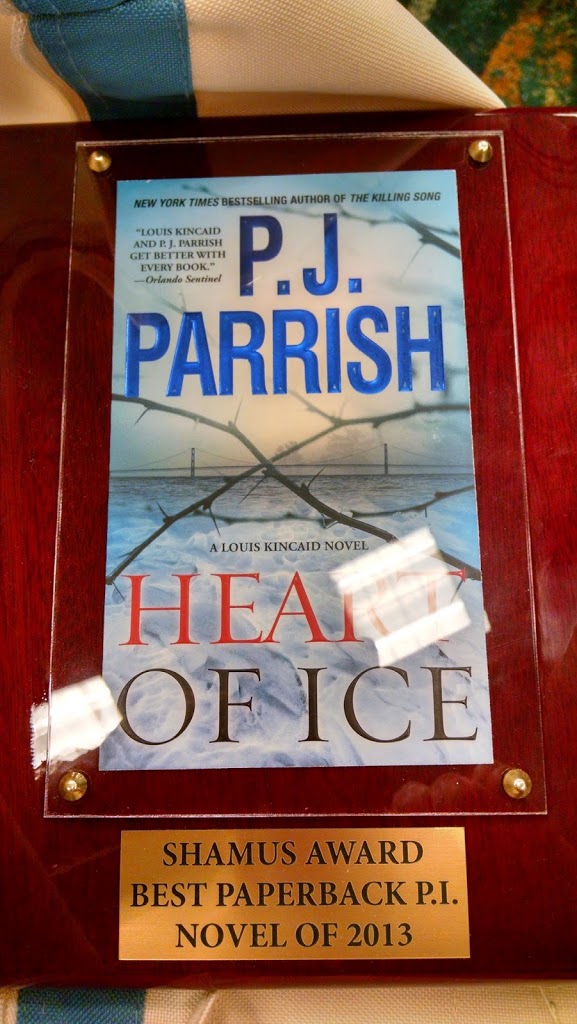James Scott Bell
@jamesscottbell
I was all ready to lay down my binoculars high in my observation tower and note that a certain peace had settled upon the land of publishing. Battles fought a couple of years ago, full of fury and bile, seem largely to have quieted down to the level of a spirited discussion. Both sides, traditional and indie, had reached a tentative, though perhaps still wary, acceptance of each other’s existence. And then came the Hydra’s head (see #1, below). [UPDATE: Random House responded to the pressure and has modified its contract terms]
I have a lot to report today, so you might want to bring a snack. We begin with:
1. Digital Only Contracts From Traditional Publishers
As part of their adaptive strategy, some big publishers are offering digital-only contracts. Thomas Nelson, Little Brown UK and Random House are three examples. I know a couple of authors who have entered into such contracts. Both were no advance and a 50/50 royalty split. The publishers offered an editor, publicist and all the prep work (cover design, formatting, etc.) However, these costs (which are at the sole discretion of the publisher) are borne by the author, deducted from the author’s cut of the revenue right off the top.
NOTE: These types of deals are not the same as “vanity publishing.” That’s a whole other can of sour worms. See, e.g., April Hamilton’s take on Simon & Schuster’s foray. But because the author is expected to pick up costs a traditional publisher used to cover, there’s a certain blurring of lines that is occurring in the new world order.
The natural question is, what is the advantage for the author? The answer has to be a combination of these three: a) the “prestige” of being published by a traditional house; b) the chance to be taken up to the “big leagues” for print and further push with serious dollars; c) some marketing advantage.
That last is the real kicker. Random House’s press release states, “For the first time in history, authors will be able to forge wide-reaching and long-lasting relationships with their audiences, and we at Random House can’t wait to explore and create new opportunities in the digital space. The possibilities are endless, and we’re excited to offer authors the best opportunities to take advantage of this growing marketplace.”
This is the rub that has yet to be proved: can the big publishers offer authors the “best opportunities” in the digital world? Is there some form of marketing they have that authors cannot replicate or surpass on their own? If there is, is it worth giving up a book for the “life of the copyright” (a term in one of the contracts) and half the net income?
The Science Fiction & Fantasy Writers of America issued the following note to its members regarding one of Random House’s imprints, Hydra, which is for SF:
SFWA has determined that works published by Random House’s electronic imprint Hydra cannot be use as credentials for SFWA membership, and that Hydra is not an approved market. Hydra fails to pay authors an advance against royalties, as SFWA requires, and has contract terms that are onerous and unconscionable.
Hydra contracts also require authors to pay – through deductions from royalties due the authors – for the normal costs of doing business that should be borne by the publisher.
Hydra contracts are also for the life-of-copyright and include both primary and subsidiary rights. Such provisions are unacceptable.
As with every business partnership, there are specific costs associated with bringing a book successfully to market, and we state them very straightforwardly and transparently in our author agreements. These costs could be much higher–and certainly be more stressful and labor-intensive to undertake–for an author with a self-publishing model. Profits are generated once those costs are subtracted from the sales revenue. Hydra and the author split those profits equally from the very first sale. . . .
[M]y colleagues and I would welcome the opportunity to meet with you at your earliest convenience to discuss the advantages of the Hydra business model, describe the program overall, and respond to any of your expressed concerns. Please let me know a good time for us to set up this meeting.
Unfortunately, there is very little to discuss. SFWA has determined to its own satisfaction that Hydra does not meet our minimum standards for a qualifying market, as its contract does not offer an advance. Additionally, your attempt to shift to the author costs customarily borne by the publisher is, simply, outrageous and egregious. The first of these things alone would disqualify Hydra as a qualifying market. It is the second of these things, however, that causes us to believe that Hydra intends to act in a predatory manner towards authors, and in particular toward newer authors who may not have the experience to recognize the extent to which your contract is beyond the pale of standard publishing practices.
You extol your business model as “different”; the more accurate description, we believe, is “exploitative.” We are particularly disappointed to see it arising out of Random House, a well-regarded, long-standing publishing firm. Bluntly put, Random House should know better.
2. The Continuing Decline of Physical Shelf Space
Barnes & Noble had a terrible quarter (ending January, 2013). Revenues fell 8.8%, to $2.2 billion, and net loss was $6.1 million. Much of the loss was Nook traceable: $59 million in additional inventory charges because of unsold goods, $21 million in returns from partner retailers, $15 million in promotional allowances “to optimize future sales opportunities” and higher advertising charges.
On the bookstore side, the big digital obstacle is the decline of the printed book, an inevitability that has to be faced no matter how warmly one feels toward the printed word. We’ve learned from CDs and DVDs that once a physical medium begins to slide, it slides rapidly. Even if readers initially lose only a tenth of their interest in buying physical books, they will end up coming to the store 20% less often, which will lead the bookseller to shrink inventory accordingly, causing even less commitment to physical books, and so on. Play that out several iterations and you end up with a business half the size of the prior business in short order. As happened to Borders, such a rapid decline usually leads to surrender. In that world, the retail unit would have to encourage foot traffic to the store with some other physical product that isn’t so easily substituted digitally. I wouldn’t be surprised if Barnes & Noble sells frozen yogurt in the future — whatever it takes to grab customers and keep them coming back often.
3. The Disappearance of the Midlist Author
This report, about author Mary Doria Russell, evidences the obsolescence of the midlist author. The trads need blockbusters and A-listers, and even if your books earn out, and receive prestigious awards, that may not be enough to continue the relationship.
Just as her new novel, Doc, was being released in 2011, [Russell] got word that her publisher [Random House] was not interested in any more books from her. She had been with Random House since 1996 and published five novels with the New York house. During that time, she had won an Arthur C. Clarke Award and an American Library Association Readers Choice Award. Entertainment Weekly had chosen The Sparrow as one of the 10 best books of year.
But that didn’t matter. Random House was done with her.
“There was no indication that was going to happen,” she said at the Howard County Library Gala on Feb. 23. “It was like having your husband throw you a 25th wedding anniversary party, and then serve you with divorce papers at dessert.”
So where does that leave the midlist author? See #4 and #5, below.
4. The Rise of the Entrepreneurial Author
Outside the walls of the Forbidden City you’ll find the encampment of a new breed of entrepreneurial author. Not just writers who are putting books up for digital sale, but those who are teaching themselves to think like a business and, as a result, are making a profit every month.
These authors know that any successful enterprise requires vision, planning and quality controls. And those who put those practices in place have a much greater chance to rise above the gurgling milk of indie sameness to become some of the sought-after cream.
5. The Emergence of the Business-Savvy Hybrid
And over here we find the author who is, or may soon be, trucking in both worlds, indie and traditional. And why not? It makes perfect business sense for a traditional publisher and an author who can deliver the goods to reach a mutually beneficial arrangement. There’s even a new literary agency, Foreword, “blending the knowledge and skills of traditional publishing with the brash new opportunities engendered by digital publishing.”
What “mutually beneficial” means will vary according to circumstances, but there are three major areas for negotiation:
a. The digital royalty split. Should be up for discussion. Holding the line at an arbitrary 25% to the author is not reasonable.
b. A meaningful and limited non-compete clause. No author should sign a traditional contract with an overbroad non-compete clause. On the other hand, no author should refuse a clause that restrains him from publishing a similar book that could directly compete with what the publisher is doing (e.g., similar form and genre). But the author should be free to publish other works (to be defined specifically) such as novellas and stories and perhaps even books of another genre. Further, the author owes the publisher his “best efforts,” and that means when you owe the publisher a book, you must give your full attention to that book over and above what you self-publish.
c. A definite term with benchmarks. Giving up rights for the “life of copyright” is a fool’s gambit for the author. Publishers need to see that there is room for creativity here. For example, the contract could be for three years with an option for more. That’s what startup Premier Digital Publishingoffers its authors, among whom are Alan Jacobson, Piers Anthony and the Stephen Ambrose estate.
Also, a contract ought to require a substantive minimum royalty to the author every six months or a reversion of rights is triggered. This is especially true with a risk-free (to the publisher) no-advance contract.
This is business. The author who is informed can come to the table with more than just his hat in hand. Be informed. Know the key terms of a contract. Search around at blogs like The Passive Voice and Kristine Kathryn Rusch’s archive of “Business Rusch” posts, and always check out the twice-weekly Ether columns by Porter Anderson.
In a story about Hugh Howey, the Wall Street Journal states: “Publishing houses that once ignored independent authors are now furiously courting them. In the past year, more than 60 independent authors have landed contracts with traditional publishers. Several won seven-figure advances. A handful have negotiated deals that allow them to continue selling e-books on their own, including romance writers Bella Andre and Colleen Hoover, who have each sold more than a million copies of their books.”
6. 99¢ to Become the New “Free”?
A lot of blogdom in the last couple of weeks had been taken up with the decision by Amazon to limit payouts to its affiliate sites who generate traffic by hyping free books (mostly by authors participating in the KDP Select program). Without going into all the details and consequences (which have yet to play out), many are saying the value of the free book for self-publishing authors (viz., discoverability) has been severely reduced.
I don’t know whether this is a good thing or a bad thing. I think the value of FREE has downgraded naturally over time because all pricing decisions have effects on consumer behavior. My feeling (and it is a feeling, I don’t have data) is that a certain wariness about free books has set in, some readers feeling “burned” by less than quality content.
So where does that leave authors? Well, why not make 99¢ your new “free”? I ran a special for book #1 in my historical series, “The Trials of Kit Shannon.” The first book is CITY OF ANGELS, priced at $3.99. Last week I priced it at 99¢ and got the word out. On March 3 its Amazon rank (at the regular price) was #64,857. The next day, at the special price, it shot up to #283 in the paid Kindle store and #1 in religious/historical. I popped in to check later and it was #112 over all. In addition, sales of all the books in the series received a nice bump.
A good time was had by all.
7. A Challenge to Amazon?
A consortium of German booksellers, plus the world’s largest publisher and one of the world’s largest telecomm companies, have banded together to mount a Euro-challenge to Amazon’s digital territory. As outlined in Digital Book World:
The bookstore chains Thalia, Weltbild and Hugendubel have partnered with Bertelsmann (Random House parent) and Deutsche Telekom, parent to T-Mobile and other huge firms, have partnered to form Tolino, a company that will produce the Tolino Shine e-reader and sell ebooks. It goes on sale on March 7 in Germany for €99 ($129).
Tolino’s stats are formidable. It starts life for sale in 1,500 retail locations around the country and will have 300,000 titles available for purchase at launch (Amazon’s German Kindle store has over 1.8 million titles, however). One of its backers is heavyweight enough to compete with Amazon – Deutsche Telekom had €58.2 billion in revenues last year compared to $61.1 billion for Amazon.
Such challenges in industry are faced with a couple of huge obstacles, not the least of which is being “late to the game.” Plus, Amazon is not the leader without reason. It’s done most everything right, from customer service to innovation. So only an opponent of Bertelsmann’s size, seeking to nab a chunk of territory (and expand later), can possibly make the attempt. But will it be enough? Note: Read Sun-Tzu’s The Art of War if you want to follow the battle plans. Or play a good game of Risk.
8. The Rediscovery of Stoic Joy
I recently enjoyed this book: A Guide to the Good Life: The Ancient Art of Stoic Joy by William P. Irvine. The Stoics were the first cognitive therapists. They said, Look, most of your troubles are in your mind. If you learn to think right, you’ll feel right. Their wisdom is basic and easily understood, but it’s also an art you have to practice. We are prone to worry and fretting over things we can’t control. When it’s not a “chemical” problem, thinking straight is most often the answer.
And so, dear writer, in this new age of publishing anxiety, I commend to you one Epictetus, Stoic philosopher born in the mid-first century, who said, “There is only one way to happiness and that is to cease worrying about things which are beyond the power of our will.”
You can’t change the tides of technology, consumer behavior, or industry by the power of your will. You can’t will your book to the top of a bestseller list. Nor should you bear ill will toward, or waste time envying, other authors.
What iswithin your power are the words you write and the discipline you bring to the craft. Put your mind to that, and forget the rest. After you’ve written your quota for the day, put on Doris Day’s rendition of “Que Sera Sera,” open up a nice Pinot Noir and laugh with someone you love.
And tomorrow? Write some more.





